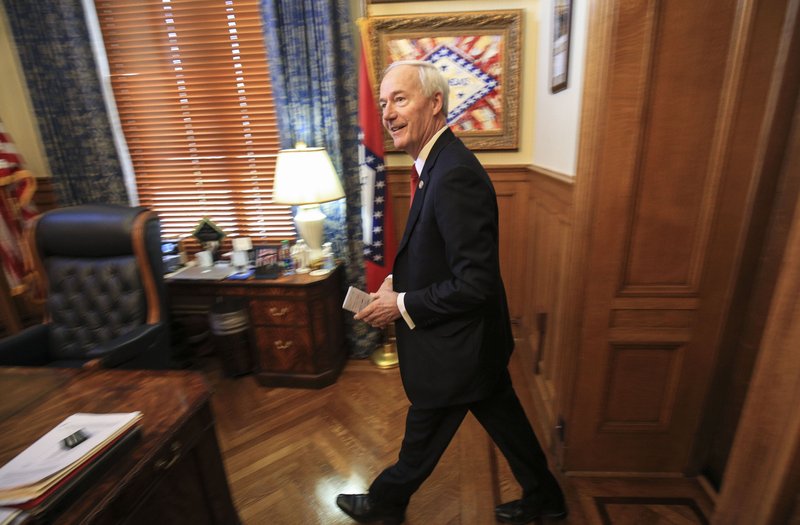The state's general revenue budget would increase by $124.1 million to $5.75 billion in the fiscal year starting July 1 under a proposal negotiated by legislative leaders and Gov. Asa Hutchinson and released Friday afternoon.
Most of the increased general revenue in fiscal 2020 would go to the state Department of Human Services, which would get a $68.2 million increase to $1.73 billion, and the Public School Fund, which would get a $30.7 million increase to $2.25 billion, according to a copy of the proposed budget released by the Bureau of Legislative Research.
The Revenue Stabilization Act distributes state general revenue to various state-supported programs including public schools, colleges and universities, human services, prisons, and the Arkansas State Police. It doesn't include federal funds.
"It is pretty much what [the governor proposed in November] and pretty much what the governor wanted to do," said a Joint Budget Committee Co-chairman, Rep. Lane Jean, R-Magnolia.
In November, Hutchinson proposed a fiscal 2020 budget that would be $125.2 million more over the current fiscal year's budget. It also totaled $5.75 billion, with most of the targeted increases going to human services and education programs, including a boost in teacher pay.
[RELATED: Complete Democrat-Gazette coverage of the Arkansas Legislature]
The committee's other co-chairman, Sen. Larry Teague, D-Nashville, said he's "fairly content" with the latest proposed budget.
Hutchinson said the proposed Revenue Stabilization Act gives him the tools to conservatively manage state funds during the next fiscal year.
He said it would fully fund the educational adequacy needs identified by the Legislature and provide more funds for public safety, including the Department of Correction and Department of Community Correction, and the Arkansas State Police.
The proposal -- distributed to lawmakers Friday -- would divide the projected general revenue into A, B and C categories, with $5.61 billion going to Category A, $115.6 million to Category B and $14.7 million to Category C.
The state's top spending priorities are placed in Category A, with the other categories of lesser spending priority. Funding to Category B only flows after Category A has been fully funded, and funding to Category C only flows after Category B has been fully funded. The goal of the act is to prevent deficit spending.
"A and B are fully funded and C will depend on the revenue [from tax collections]," Jean said.
Category B includes $64.1 million for the human services department and $30.8 million for general education in the Public School Fund. Category C is $14.7 million for the state's Performance Fund, which was formerly called the Merit Adjustment Fund, and would be used to help fund salaries of state employees.
The proposed budget relies on using existing fund balances of $25 million from the state's Performance Fund for performance-based raises and other raises for employees, Jean said. The Performance Fund will be replenished if the state collects enough tax revenue to fund Category C, he said.
"There is a full commitment to merit pay raises and needs of staff," said Hutchinson.
The Revenue Stabilization Act would expand the budget for the Department of Human Services to $1.73 billion, an increase of $68.2 million. That includes a $61.6 million increase, to $1.31 billion, in the grants category for the state's Medicaid program in fiscal 2020.
It also includes $2.5 million for the state's four crime stabilization units that are designated as a temporary place to send people with mental health emergencies.
This year, the state is paying 7 percent of the cost of the Medicaid expansion program called Arkansas Works, which provides health insurance coverage to about 235,000 low-income Arkansans. The state's share will increase to 10 percent next year under existing federal law.
In fiscal 2020, the state's share of the cost of the program is projected at $177 million and the federal government's share at $1.91 billion, according to a spokesman for the state Department of Finance and Administration. In fiscal 2019, the current fiscal year, the state's share has been projected at about $135 million and the federal government's share at $1.95 billion.
Hutchinson has been aiming to slow the growth of the traditional Medicaid program to pay for the state's increased share of funds for the Medicaid expansion program.
The Revenue Stabilization Act proposes a $7.8 million increase to $360.9 million for the Department of Correction, a $5.5 million rise to the Department of Community Correction to $93.4 million, and a $5.2 million increase to $71.6 million for the Arkansas State Police.
The state's two- and four-year colleges would get a $4.1 million increase to $749.7 million under the proposed general revenue budget as a result of a funding formula and increases for higher education entities not under the funding formula.
The proposed general revenue budget also sets aside $15.8 million in rainy-day funds.
Jean said that he expects the Joint Budget Committee to consider the proposed Revenue Stabilization Act during its meeting Monday and then for the House and Senate to consider identical Revenue Stabilization Act measures on Tuesday. Wednesday, the bills would be considered by the other chamber, he said.
He said he hopes lawmakers will wrap up business on Wednesday for this year's regular session, which started Jan. 14.
A Section on 04/06/2019
